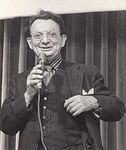 |
|
|||||||||||||||||||||||||||||||||||||||||||||||
|
Haddonfield Public Schools Alumni |
||||||||||||||||||||||||||||||||||||||||||||||||
|
||||||||||||||||||||||||||||||||||||||||||||||||
|
A Look Back: Bernard and Isidore FeinsteinContributed by John Phaup '57
That Russian immigrant and future father was Bernard Feinstein. Feinstein was an adopted name he acquired on his way to America. And his son was I. F. Stone who graduated from HHS in 1924 as Isadore Feinstein. He was known affectionately as Izzy. I learned of I.F. Stone’s ties to Haddonfield in a history I read a year or two ago. Stone is remembered as a nationally recognized journalist; the creator of I.F. Stone’s Weekly, an independent newsletter read by some 70,000 influential readers from the mid-1950s to the early 1970s. A classical, scholar Stone wrote The Death of Socrates (1989), still read and stacked by public libraries, including the one in the small Southern city where I live, New Bern, NC. Stone was a Jeffersonian democrat who held the Bill of Rights as his bible. He loved a quote of Jefferson’s which I paraphrase, given the choice between a free press and no government; or government with no free press; he’d choose the former. While I. F. Stone’s life is well documented in several biographies including Myra MacPherson’s, All Governments Lie (2006), it was Stone’s father who intrigued me from my reading. The following notes are offered in the interest of admiring what one immigrant brought to his adopted country, and the incredible journey that he experienced. Born in 1876, Bernard Feinstein, a Jewish lad between the ages of 12-14 became a draftee into the czarist Russian Army, despite some name-changing by his family to avoid such a fate. His grandfather was a Tankonogy or a Tsvilichovsky. Unmentioned in the biographies is what name he adopted to avoid military conscription. The name change didn’t work. At age 29 in 1905, word came that his unit was shipping out to join others in the Russo-Japanese War, near the Korean peninsula. Feinstein slipped from his barracks one night, and from near Grodno, Belarus, just east of Poland, he walked the four-hundred-mile distance to Hamburg, Germany, knowing he could be shot on sight as a deserter. In Germany, he adopted the German name Feinstein, boarded a ship, and sailed to Liverpool, England. Feinstein had a brother who lived in Wales and who may have helped Bernard with the cost of travel. I conceive of an underground railroad existing in Russia and Germany to assist those wishing to flee. Be that as it may, the newly dubbed Feinstein was able to book passage to America. He lived briefly in a tenement in New York City, met and married Katy Novack, had a son, Izzy, and moved to Indiana. By then Izzy was enrolled in kindergarten. From there the family moved to Philadelphia and, later, Haddonfield. In Haddonfield Feinstein peddled watches on the train commute to Camden and Philadelphia, before opening the Feinstein Dry Goods Emporium on Kings Highway. His store succeeded and Feinstein prospered in the 1920s. At one point he borrowed some $120,000 (roughly $1.7 million in today’s money), played the stock market, won, and quickly repaid the bank. At the end of the decade he owned several rental properties in and around Haddonfield. Such prosperity, unfortunately, was not to last. He lost nearly everything in the crash of 1929. To his credit he did, eventually, pay off his debts. After this he is largely lost to his son’s biographies. Izzy meanwhile began journalism as a stringer (local correspondent) for the Camden Courier Post while a high school student. He graduated to the editorial desk, attended Penn briefly, and stayed with publisher David Stern for 16 years, working at three of Stern’s papers. In school he went from speaking only Yiddish, when he entered kindergarten in Indiana, to speaking English, and reading German, Hebrew and Latin by the time he graduated from HHS, then located in the Brown Building which stood on the grounds of Central/Middle School. He changed his name in the late 1930s to avoid the anti-Semitism found in this country and emanating from Germany. (The name Stone is a pseudonym he used previously when writing about controversial topics.) Is there a moral here for today’s world? Bernard left Russia thinking and hoping he could get to this country. America at the time was known as “the last best hope of Earth,” words said by Abraham Lincoln, who himself extended a thought by Thomas Jefferson. Ronald Reagan and Barrack Obama, political leaders of far varying beliefs, have both spoken versions of these words while in office. Some one million Jews left Eastern Europe between 1900 and 1910 for the United States. Feinstein was one of them. Let me put this in the starkest terms I can. Bernard Feinstein went from being cannon fodder for the Russian Army in 1905 to a prosperous American merchant in some 18 years. If that’s not the realization of hope, I don’t know what is. Along the way he inspired a journalist whose own words burn with love of this country. May hope survive. |
||||||||||||||||||||||||||||||||||||||||||
|
|||||||||||||||||||||||||||||||||||||||||||



 In these days of immigrant–bashing, it gives one pause to reflect on an immigrant who came to America in the early twentieth century and who, after marriage, fathered a son who became one of Haddonfield High School’s (HHS) more illustrious graduates.
In these days of immigrant–bashing, it gives one pause to reflect on an immigrant who came to America in the early twentieth century and who, after marriage, fathered a son who became one of Haddonfield High School’s (HHS) more illustrious graduates.